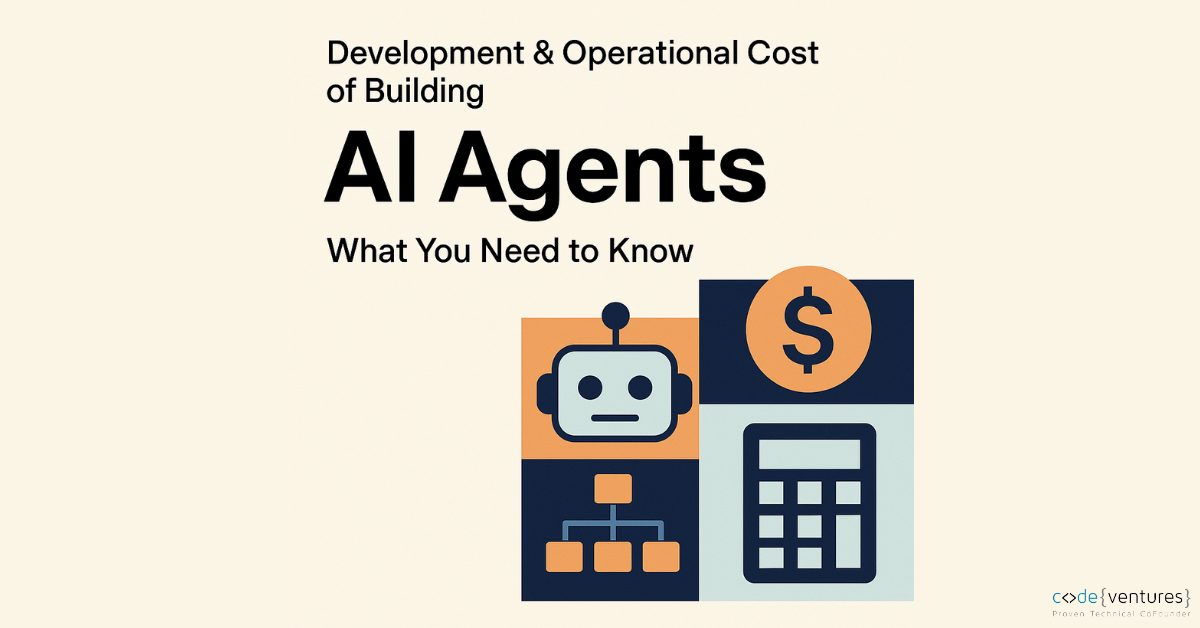Development & Operational Cost of Building AI Agents | Codeventures

Artificial Intelligence (AI) agents are revolutionizing how businesses operate. From intelligent customer support bots and virtual sales assistants to autonomous research analysts and workflow automation tools, AI agents are at the forefront of digital transformation. However, while the potential benefits are widely recognized, the true cost of building and running these agents is often misunderstood or underestimated.
In this blog, we’ll provide a detailed breakdown of:
- What AI agents are and what they do
- Key software product development for startups and operational cost components
- Hidden or ongoing expenses you should prepare for
- Practical budgeting tips for AI-powered solutions
What Is an AI Agent?
An AI agent is a software system capable of perceiving its environment, making decisions, and taking actions autonomously to achieve specific goals. These agents often leverage technologies such as:
- Natural Language Processing (NLP) to understand and generate human language
- Machine Learning (ML) to adapt and improve from data over time
- Logic-based systems to make decisions based on rules or constraints
Common Use Cases of AI Agents
AI agents are versatile and can be tailored for a wide range of business applications. Below are some of the most impactful and commonly adopted use cases across industries:
1. Scheduling Assistants
AI-powered scheduling assistants simplify the often time-consuming process of managing meetings. These agents can:
- Interpret natural language commands (e.g., “Book a call with John next Tuesday”)
- Coordinate across multiple calendars and time zones
- Automatically detect availability conflicts
- Send confirmation emails and reminders
- Reschedule meetings dynamically based on changing priorities
🔍 Use Case Example: An executive assistant bot that manages a CEO’s weekly calendar, optimizing for back-to-back meetings, preferred time slots, and buffer periods.
Business Impact: Saves hours of manual coordination and reduces scheduling errors, especially in high-volume client-facing roles.
2. AI Research Analysts
These agents serve as intelligent assistants for knowledge work, capable of:
- Reading and summarizing lengthy documents, reports, or PDFs
- Extracting key insights, data points, and trends
- Comparing sources or synthesizing information across multiple files
- Generating structured outputs like executive summaries or briefings
🔍 Use Case Example: A legal AI analyst that reviews hundreds of pages of court filings to extract relevant case law and generate a summary for lawyers.
Business Impact: Dramatically speeds up research time, increases accuracy, and allows professionals to focus on high-level analysis.
3. Customer Service Bots
AI customer service agents are trained on company-specific knowledge bases to provide instant, consistent, and accurate support. They can:
- Answer FAQs and troubleshoot issues
- Escalate complex cases to human agents
- Collect contextual information before escalation
- Operate 24/7 across multiple channels (chat, email, voice)
🔍 Use Case Example: A SaaS company’s AI bot handles 70% of incoming support tickets by referencing internal documentation and user behavior logs.
Business Impact: Reduces ticket volume for support teams, improves response times, and enhances customer satisfaction.
4. Sales Agents
AI agents are increasingly being used in the sales funnel to automate and accelerate revenue operations. These agents can:
- Qualify leads based on predefined criteria
- Send personalized outreach emails
- Follow up automatically based on recipient behavior (opens, clicks)
- Integrate with CRM systems like Salesforce or HubSpot.
🔍 Use Case Example: An AI agent that handles outbound prospecting by generating tailored email sequences, booking calls, and updating CRM entries.
Business Impact: Increases lead conversion efficiency, shortens the sales cycle, and reduces manual workload for sales teams.
Why Use Cases Matter
Whether for internal productivity or external customer interaction, the success of an AI agent depends not just on the technology but on how well it aligns with a real business need. Designing an agent with a clearly defined, high-impact use case ensures better adoption, faster ROI, and smoother integration with existing workflows.
Development Costs: Building an AI Agent
1. Planning & Research
Before any development begins, it’s crucial to define the agent’s purpose, functionality, and target users. This phase typically includes:
- Problem scoping: Identifying clear objectives the AI agent should achieve.
- Workflow mapping: Laying out how the agent will operate in a real-world context.
- Data strategy: Determining what data is needed and how it will be sourced.
Estimated Cost: The Planning & Research section is estimated to require 80–200 hours, with a projected cost of $2,000–$7,000.
(Higher if external consultants are involved.)
2. Data Collection & Preparation
AI models are only as good as the data they’re trained on. Depending on your use case, this may involve:
- Data extraction: From APIs, internal documents, chat logs, etc.
- Data labeling: Annotating examples for training supervised models.
- Data cleaning: Removing duplicates, standardizing formats, and normalizing input.
Estimated Cost: The Data Collection & Preparation section is estimated to require 200 – 600 hours, with a projected cost of $5,000 – $21,000.
(Costs rise significantly for domains requiring expert annotation, like healthcare or law.)
3. Model Selection or Custom Training
You can approach this in one of three ways:
- Pre-trained models: Utilize commercial APIs like OpenAI’s GPT, Claude, or Gemini.
- Fine-tuning: Customize a model on your domain-specific data.
- Training from scratch: Building a proprietary model—resource-intensive and rare outside enterprise or research settings.
Estimated Cost:
- API Integration: $2,000 – $5,600
- Fine-tuning: $3,000 – $8,400
- Training a model from scratch: $10,000 – $63,000
4. Agent Architecture & Software Development
This phase brings the agent to life by designing its operational backbone:
- Prompt engineering for LLMs (Large Language Models)
- Task orchestration for multi-step workflows
- Memory and context handling to maintain continuity
- API integration with your existing tools and systems
- User interface (UI) development if the agent is interactive
Estimated Cost: The Agent Architecture & Software Development section is estimated to require 200 – 800 hours, with a projected cost of $5,000 – $28,000.
(Depends on feature set, tech stack, and team experience.)
5. Testing, QA & Iteration
AI agents require rigorous testing due to their probabilistic behavior:
- Edge case testing to handle uncommon user inputs
- Prompt/model tuning to improve accuracy
- Error analysis and hallucination mitigation
- Continuous iteration as usage grows
Estimated Cost: The Testing, QA & Iteration section is estimated to require 60 – 140 hours, with a projected cost of $1,500 – $4,900.
(Multiple cycles may be needed during and post-launch.)
Operational Costs: Running the AI Agent
1. Model API Usage or Hosting
You’ll need to choose between:
- Hosted APIs (e.g. OpenAI, Anthropic, Google): Pay-per-token pricing.
- Self-hosted models (e.g. LLaMA, Mistral): Greater control, but higher infra costs.
The GPT-4 API (April 2025) supports pricing per 1 million tokens. For high-traffic agents, monthly usage can scale significantly. Self-hosting requires GPU servers and ongoing engineering maintenance.
2. Cloud Infrastructure & DevOps
AI agents typically rely on cloud services to operate smoothly. Key components include:
- Databases: Often vector-based (e.g., Pinecone, Weaviate) for contextual memory.
- Serverless orchestration or containerized environments
- Monitoring/logging tools for reliability and observability
3. Continuous Improvement & Maintenance
Unlike traditional software, AI agents must evolve to stay relevant:
- Feedback loops for improvement using human-in-the-loop (HITL) methods
- Model retraining or re-prompting as data and user behavior shift
- Integration updates to align with changes in tools, APIs, or business rules
Recommendation: Allocate 15–25% of your initial development cost annually for maintenance and upgrades.
Tips to Keep AI Agent Costs Under Control
- Start with a narrow use case: Solve one business problem well before expanding.
- Leverage pre-trained models: Avoid premature fine-tuning or custom training.
- Invest in prompt optimization: Cleaner prompts mean fewer tokens, better results.
- Monitor usage patterns: Implement usage limits and token tracking to control spend.
- Link to ROI: Track metrics like hours saved, ticket reduction, or lead conversion.
Final Thoughts
AI agents can significantly boost productivity, customer satisfaction, and business intelligence, but they’re not a plug-and-play solution. Their development and operational costs can vary widely based on the scope of work, the sophistication of the agent, and how it’s deployed and maintained. However, with careful planning, realistic budgeting, and a strong understanding of long-term needs, AI agents can be a high-ROI investment that drives your business into the future.
Partnering for Success: Collaborate with Codeventures
Navigating the complexities of AI agent development and deployment can be challenging. If you’re seeking a partner to guide you through this startup journey, Codeventures offers comprehensive support tailored to your needs.
As a startup incubator, we provide interim technical co-founders or startup resources to help transform your idea into a successful venture. The services encompass web and mobile application development, including AI and machine learning, and user acquisition strategies. Through the Discovery Workshop, we work closely with you to craft a comprehensive blueprint for your product, covering aspects like user flow, MVP definition, and go-to-market strategy. We also provide valuable resources to empower founders, from startup fundraising guidance and pitch development to product validation and scaling advice.

Let’s Build Your Next Project Together
Take your startup to the next level with our expert guidance and technical solutions. Partner with us and unlock new opportunities for success!
Contact Us
